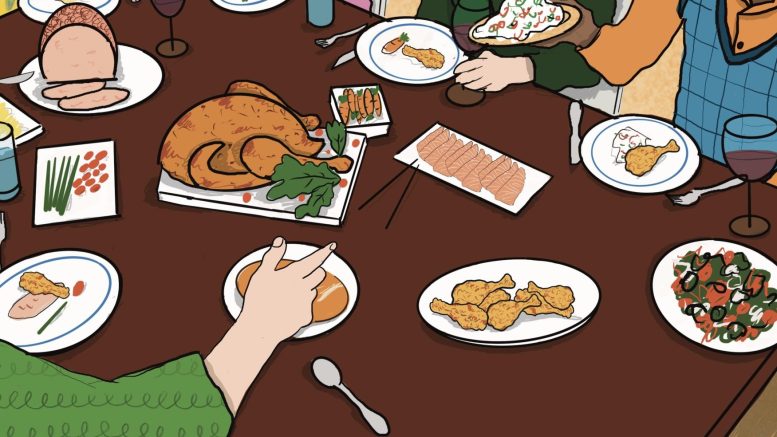My favourite part of the holiday season as a student is the break we are finally rewarded with after the fall semester’s constant bombardment of work.
During the break, there are always many fun festivities. But what I value most is the time I am allowed to nurture the connections I share with my family and friends. Nurturing can vary from sharing food, to meeting for drinks without having to worry about an assignment being due next Friday to reading in silence with one another.
While family gatherings can be difficult and complicated, I have always appreciated the times my family comes together and shares food.
I am a mixed Japanese Canadian, or Nikkei. My family was interned during the Second World War. My family was uprooted from Strawberry Hill, B.C. and relocated to work on sugar beet farms in Manitoba. Like many other Japanese Canadian families who were dispossessed, forcibly relocated and dispersed across Canada, amongst everything my family lost, we also lost our language and cultural roots.
I grew up with incredibly limited ties to my community with the exception of the Japanese Cultural Association of Manitoba’s yearly children’s Christmas party, curling bonspiel and picnic. There were some ways I was more disconnected from my culture. I did not grow up learning Japanese, eating Japanese food outside of some occasions nor feeling any connection to my culture in general.
However, the winter holiday is a time where my family gathers and our togetherness creates a connection. Our dinners are a clash of cultures.
The spread features the typical Western holiday dinner standbys like turkey, potatoes, stuffing and cooked vegetables.
It doesn’t stop there. We also have a bucket of KFC fried chicken, plates of sashimi, inari and futomaki prepared by my grandmother. While this menu may appear to be a mismatched clash of tastes, to me it makes perfect sense and it all belongs.
These dinners, especially around the holiday season, are when my family’s mixedness is something we actively engage with and consume. The intimacy we share comes not from the words off our tongues, but from the food we share that fills our stomachs.
We acknowledge our history and present through food, loading our plates full of chicken, tuna sashimi, turkey, potatoes and futomaki.
Food has become a strong point of my connection with culture, spanning from cooking family recipes to local community’s recipes and beyond.
I love looking for ingredients in local Asian grocery stores. I love the smell of flavours that envelop my house while I cook, snacking throughout the process and tasting the familiarity of home. I love sharing this taste with my family and friends, knowing the labour and care I put into cooking will nourish others.
While it is easy to get swept up in the worry of buying gifts, organizing and attending parties, I think it is important and essential for all of us to take a collective deep breath and remind ourselves of our own needs and desires.
Feminist thinker Audre Lorde argues that desire, joy and intimacy are essential components to human existence. Our engagement with life should demand joy and intimacy through every facet of our lives.
While this may be hard to remind ourselves of and implement these notions into our daily lives as students when it feels like we are always drowning in assignments and exams, we should still strive to find and create these moments of joy and intimacy. This winter break is a great time to begin nurturing this joy and intimacy we share between and within ourselves and others.




